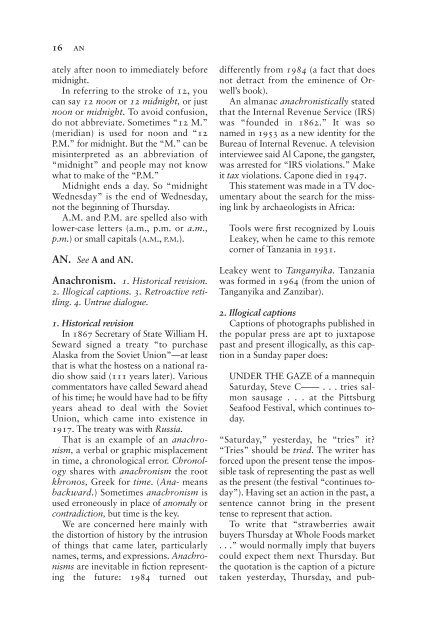- Page 2 and 3: penguin reference THE PENGUIN DICTI
- Page 4 and 5: PENGUIN REFERENCE Published by the
- Page 6 and 7: introduction Watching Our Words Aim
- Page 8 and 9: introduction ix children and make t
- Page 10 and 11: introduction xi Our language is an
- Page 12 and 13: xiv general topics Participle Perso
- Page 14 and 15: the PENGUIN DICTIONARY of AMERICAN
- Page 16 and 17: 2 abbreviation ways. See A WHILE an
- Page 18 and 19: 4 acronym for example, they mean he
- Page 20 and 21: 6 ad and add necessary . . . ,” d
- Page 22 and 23: 8 admission overlook the effect of
- Page 24 and 25: 10 affect and effect cated other pe
- Page 26 and 27: 12 alibi The same questions may be
- Page 28 and 29: 14 also to work on time.” The “
- Page 32 and 33: 18 and that, and which, and who one
- Page 34 and 35: 20 any tion: “I can hardly wait t
- Page 36 and 37: 22 ape and monkey The words unquest
- Page 38 and 39: 24 around gests an identifying and
- Page 40 and 41: 26 as his movie roles—tromping ar
- Page 42 and 43: 28 as best one thing to another, th
- Page 44 and 45: 30 auxiliary verbs (helping verbs)
- Page 46 and 47: B BACHELOR and SPINSTER. A movie re
- Page 48 and 49: 34 bacteria and bacterium people ar
- Page 50 and 51: 36 bazaar and bizarre Some use lava
- Page 52 and 53: 38 belly the other: “The ‘night
- Page 54 and 55: 40 bevy goes with and. Sometimes th
- Page 56 and 57: 42 billion Many owners of pool hall
- Page 58 and 59: 44 blond and blonde members he repr
- Page 60 and 61: 46 bough and bow is a leading expon
- Page 62 and 63: 48 buck naked from about 1700, is p
- Page 64 and 65: 50 but This sentence is fairly clea
- Page 66 and 67: 52 capitalization an administering
- Page 68 and 69: 54 case of letters to cause to tilt
- Page 70 and 71: 56 chair CHAIR. 1. CHAIR and CHAIR-
- Page 72 and 73: 58 “chilling effect” ones refer
- Page 74 and 75: 60 clause work that has survived th
- Page 76 and 77: 62 climactic and climatic ing grace
- Page 78 and 79: 64 collective nouns to be singular:
- Page 80 and 81:
66 comfit and comfort proach a part
- Page 82 and 83:
68 comparative and superlative degr
- Page 84 and 85:
70 compassion The discussion here d
- Page 86 and 87:
72 concrete noun participle, compri
- Page 88 and 89:
74 confusing pairs same. Punctuatio
- Page 90 and 91:
76 confusing pairs ried out; “tes
- Page 92 and 93:
78 consensus CONSENSUS. A question
- Page 94 and 95:
80 contrary to popular belief venti
- Page 96 and 97:
82 could have, could’ve, and “c
- Page 98 and 99:
84 crime, misdemeanor, and felony o
- Page 100 and 101:
86 crimes (various felonies) Relate
- Page 102 and 103:
88 crisis [Host:] Why don’t they
- Page 104 and 105:
D Danglers. See Modifers, 1. DARING
- Page 106 and 107:
92 deluged the way, was the first p
- Page 108 and 109:
94 destroy their own destiny.” A
- Page 110 and 111:
96 diminuendo The paragraph below d
- Page 112 and 113:
98 dismiss or implied). “All inte
- Page 114 and 115:
100 don’t and doesn’t DON’T a
- Page 116 and 117:
102 double negative tive: either be
- Page 118 and 119:
104 doubling of letters lous writer
- Page 120 and 121:
106 dum-dum bullet result of, becau
- Page 122 and 123:
108 eager grammarians. Some say to
- Page 124 and 125:
110 eke 3. Pronunciation H. W. Fowl
- Page 126 and 127:
112 elude and allude only (1) to su
- Page 128 and 129:
114 employ celebrity, or a high pla
- Page 130 and 131:
116 era ERA. 1. Definition; pronunc
- Page 132 and 133:
118 et al. participle of the verb e
- Page 134 and 135:
120 every words, for ever, an older
- Page 136 and 137:
122 “everything from” With the
- Page 138 and 139:
124 exercise and exorcise gence off
- Page 140 and 141:
F FABULOUS. Fabulous (adjective) pr
- Page 142 and 143:
128 facticity, faction, factious, f
- Page 144 and 145:
130 fantasia The survey asked 78 fa
- Page 146 and 147:
132 fatality comparative of fore an
- Page 148 and 149:
134 fetus gallery of ghoulish nonse
- Page 150 and 151:
136 fiscal and physical The law tre
- Page 152 and 153:
138 forceful and forcible ding and,
- Page 154 and 155:
140 fortunate that state that, if w
- Page 156 and 157:
142 “freak accident” “FREAK A
- Page 158 and 159:
144 further or vehement(ly) without
- Page 160 and 161:
146 gas Is it “gantlet” or “g
- Page 162 and 163:
148 gendarme tor. So to see a headl
- Page 164 and 165:
150 gerund considered traditional i
- Page 166 and 167:
152 gerund text. Examples are the n
- Page 168 and 169:
154 good and well “. . . Has gone
- Page 170 and 171:
156 grievous, grievously GRIEVOUS,
- Page 172 and 173:
158 guilt and innocence Members of
- Page 174 and 175:
160 guy tinguished between guys and
- Page 176 and 177:
162 hard-boiled In the words of an
- Page 178 and 179:
164 havoc or had. “She had her ha
- Page 180 and 181:
166 hearty HEARTY. See HARDY and HE
- Page 182 and 183:
168 hold up, holdup, hold-up Regard
- Page 184 and 185:
170 homophones gredient, headquarte
- Page 186 and 187:
172 hopefully ters and formal docum
- Page 188 and 189:
174 hypothesis and theory It is a s
- Page 190 and 191:
176 identical The particular idea d
- Page 192 and 193:
178 imminent, imminence IMMINENT, I
- Page 194 and 195:
180 impartial The author presumably
- Page 196 and 197:
182 include cident without qualific
- Page 198 and 199:
184 inexpressible ance interests fo
- Page 200 and 201:
186 infinitive bought a ticket” c
- Page 202 and 203:
188 inflammable adequately financed
- Page 204 and 205:
190 in terms of “The buyer must b
- Page 206 and 207:
192 interrogative sentence They wer
- Page 208 and 209:
194 inversions The pronunciation is
- Page 210 and 211:
196 it, anticipatroy eration. A few
- Page 212 and 213:
198 -ize ending tion to that which
- Page 214 and 215:
200 jobless JOBLESS. The average ne
- Page 216 and 217:
202 juvenile language . . . The tim
- Page 218 and 219:
204 kiss of death there, inasmuch a
- Page 220 and 221:
L LAID and LAIN. See LAY and LIE. L
- Page 222 and 223:
208 latter This passage is from an
- Page 224 and 225:
210 lead (noun) agement would not
- Page 226 and 227:
212 leniency azine said, “Senator
- Page 228 and 229:
214 ligation and litigation cludes
- Page 230 and 231:
216 likely “It was like [as if] s
- Page 232 and 233:
218 litigation Had people been spea
- Page 234 and 235:
220 ltd., limited in, “We’ll dr
- Page 236 and 237:
222 mama Change “believes” to b
- Page 238 and 239:
224 marshal ing. Containing at leas
- Page 240 and 241:
226 mayhem C.Might can be used to e
- Page 242 and 243:
228 metal and mettle of two common
- Page 244 and 245:
230 mischievous, mischievousness co
- Page 246 and 247:
232 modifiers that appeared under a
- Page 248 and 249:
234 modifiers discuss his “plan
- Page 250 and 251:
236 modifiers is the Forum’s lead
- Page 252 and 253:
238 moisturize word or group of wor
- Page 254 and 255:
240 mother Some other adjectives an
- Page 256 and 257:
N Names of products. See Trademarks
- Page 258 and 259:
244 needless to say given name, onl
- Page 260 and 261:
246 nevertheless pay attention to o
- Page 262 and 263:
248 nonesuch, nonetheless, none too
- Page 264 and 265:
250 not NOT. 1. Ambiguity. 2. Probl
- Page 266 and 267:
252 not about to “struck a pregna
- Page 268 and 269:
254 notoriety, notorious The princi
- Page 270 and 271:
256 nouns ‘Waiting for Guffman’
- Page 272 and 273:
258 nuclear Reagan will not accept
- Page 274 and 275:
260 numbers two successive figures
- Page 276 and 277:
262 numbers A newspaper item told o
- Page 278 and 279:
264 numbers would pay the same doll
- Page 280 and 281:
266 numbers bility that the blood c
- Page 282 and 283:
O Object(ive) complement. See Compl
- Page 284 and 285:
270 -odd tional radio network menti
- Page 286 and 287:
272 on popular discussion of harlot
- Page 288 and 289:
274 one as pronoun which we may cal
- Page 290 and 291:
276 one out of or plural words go w
- Page 292 and 293:
278 only to had kept all of his cam
- Page 294 and 295:
280 outrageous, outrageously jargon
- Page 296 and 297:
282 owing to • The language is fu
- Page 298 and 299:
284 pairs of words A news story sai
- Page 300 and 301:
286 peacock A friend writes that he
- Page 302 and 303:
288 personal or a representative. E
- Page 304 and 305:
290 persons and people missioner’
- Page 306 and 307:
292 play up a case can be made for
- Page 308 and 309:
294 plus as qualities or activities
- Page 310 and 311:
296 possessive problems tificial po
- Page 312 and 313:
298 pour and pore Journalists often
- Page 314 and 315:
300 prepositions 3. Ending with a p
- Page 316 and 317:
302 prepositions tion per fits eith
- Page 318 and 319:
304 prescribe and proscribe PRESCRI
- Page 320 and 321:
306 probability is pristine or it i
- Page 322 and 323:
308 pronouns satisfy our basic need
- Page 324 and 325:
310 pronouns noun must be singular;
- Page 326 and 327:
312 pronouns English (quoted earlie
- Page 328 and 329:
314 pronouns / “themself” / “
- Page 330 and 331:
316 pronouns theirs.” / “It’s
- Page 332 and 333:
318 pronouns The newscaster and wri
- Page 334 and 335:
320 proof and evidence one another.
- Page 336 and 337:
322 punctuation proper use of the a
- Page 338 and 339:
324 punctuation in such cases is no
- Page 340 and 341:
326 punctuation pletely: “Jack sa
- Page 342 and 343:
328 punctuation [A critic] reproach
- Page 344 and 345:
330 punctuation points could be num
- Page 346 and 347:
332 punctuation The first ten words
- Page 348 and 349:
334 punctuation “It was a head-on
- Page 350 and 351:
336 punctuation begins with the nex
- Page 352 and 353:
338 punctuation But here in a glass
- Page 354 and 355:
340 punctuation seller. For those o
- Page 356 and 357:
342 punctuation because he was old
- Page 358 and 359:
344 punctuation ?????? Should - Sho
- Page 360 and 361:
346 punctuation closures, though us
- Page 362 and 363:
348 pupil and student can replace i
- Page 364 and 365:
Q Q-TIPS. See VASELINE. Quantities,
- Page 366 and 367:
352 quote and quotation 3. Unnecess
- Page 368 and 369:
354 rack and wrack nearly 200 milli
- Page 370 and 371:
356 range, true and false $2,000-to
- Page 372 and 373:
358 rape dumplings shall rise in pr
- Page 374 and 375:
360 reason Taken from the noun real
- Page 376 and 377:
362 recommit chair will allow the l
- Page 378 and 379:
364 repetition and its avoidance ti
- Page 380 and 381:
366 reversal of meaning plified by
- Page 382 and 383:
368 reverse and to place Israeli tr
- Page 384 and 385:
370 round up and roundup Romance la
- Page 386 and 387:
372 run-on sentence The failure to
- Page 388 and 389:
374 sanction and sanctions are a sh
- Page 390 and 391:
376 sentence fragment “He was fif
- Page 392 and 393:
378 series errors equal words or ph
- Page 394 and 395:
380 series errors quotation marks a
- Page 396 and 397:
382 series errors has set out to li
- Page 398 and 399:
384 sex and gender SEX and GENDER.
- Page 400 and 401:
386 simple and simplistic not a rea
- Page 402 and 403:
388 so far as C, in the sense that
- Page 404 and 405:
390 specie and species about a trib
- Page 406 and 407:
392 spelling See also FLAMMABLE (et
- Page 408 and 409:
394 spinster Some have been taught
- Page 410 and 411:
396 staff tended meaning probably w
- Page 412 and 413:
398 subjunctive 1. Among the moods
- Page 414 and 415:
400 subsequent to ography, contains
- Page 416 and 417:
402 suffix . . . [The] Geary Theate
- Page 418 and 419:
404 swamped Sustain (verb, transiti
- Page 420 and 421:
406 systematic and systemic into th
- Page 422 and 423:
408 team of ask him, “What other
- Page 424 and 425:
410 tense “Earlier this year,”
- Page 426 and 427:
412 tense and predict are among oth
- Page 428 and 429:
414 tense had hauled off and punche
- Page 430 and 431:
416 testament and testimony site. A
- Page 432 and 433:
418 than any better than he” (tha
- Page 434 and 435:
420 that Although acknowledging New
- Page 436 and 437:
422 that, all that all that money?
- Page 438 and 439:
424 that and which defining. [But t
- Page 440 and 441:
426 that, who, and which that will
- Page 442 and 443:
428 the wiched between them. This p
- Page 444 and 445:
430 there, anticipatory THERE, anti
- Page 446 and 447:
432 those and them ropean people to
- Page 448 and 449:
434 titles VICE-PRESIDENT-IN-CHARGE
- Page 450 and 451:
436 titles tion of master of scienc
- Page 452 and 453:
438 together with To can also indic
- Page 454 and 455:
440 to say nothing of tortious (TOR
- Page 456 and 457:
442 transitive and intransitive ver
- Page 458 and 459:
444 trooper and trouper Arch.” /
- Page 460 and 461:
446 type slangy phrases like “rea
- Page 462 and 463:
448 unemployed, unemployment UNEMPL
- Page 464 and 465:
450 until This discourse is to reje
- Page 466 and 467:
452 utilize, utilization tense of t
- Page 468 and 469:
454 verbal unmentionables 1. Oral a
- Page 470 and 471:
456 verbs The portion of sales hedg
- Page 472 and 473:
458 verbs sides this one, including
- Page 474 and 475:
460 vertebra and vertebrae a trap:
- Page 476 and 477:
462 vice and vise The invention of
- Page 478 and 479:
464 viz. Joint Chiefs of Staff prop
- Page 480 and 481:
466 want and wish to the danger.”
- Page 482 and 483:
468 whence and “from whence” WH
- Page 484 and 485:
470 which be inferred, but a sharpe
- Page 486 and 487:
472 who and that, who and which hol
- Page 488 and 489:
474 who and whom argued that common
- Page 490 and 491:
476 who, that, and which Who is or
- Page 492 and 493:
478 winch said, when asked if the p
- Page 494 and 495:
480 wither and writhe tion; the sec
- Page 496 and 497:
482 wrestle, wrestling and rassle,
- Page 498 and 499:
484 “yes, virginia” other y-end
- Page 500 and 501:
486 zero in numbers in the televisi
- Page 502 and 503:
488 reference works English Languag
- Page 504 and 505:
490 reference works The New York Ti












